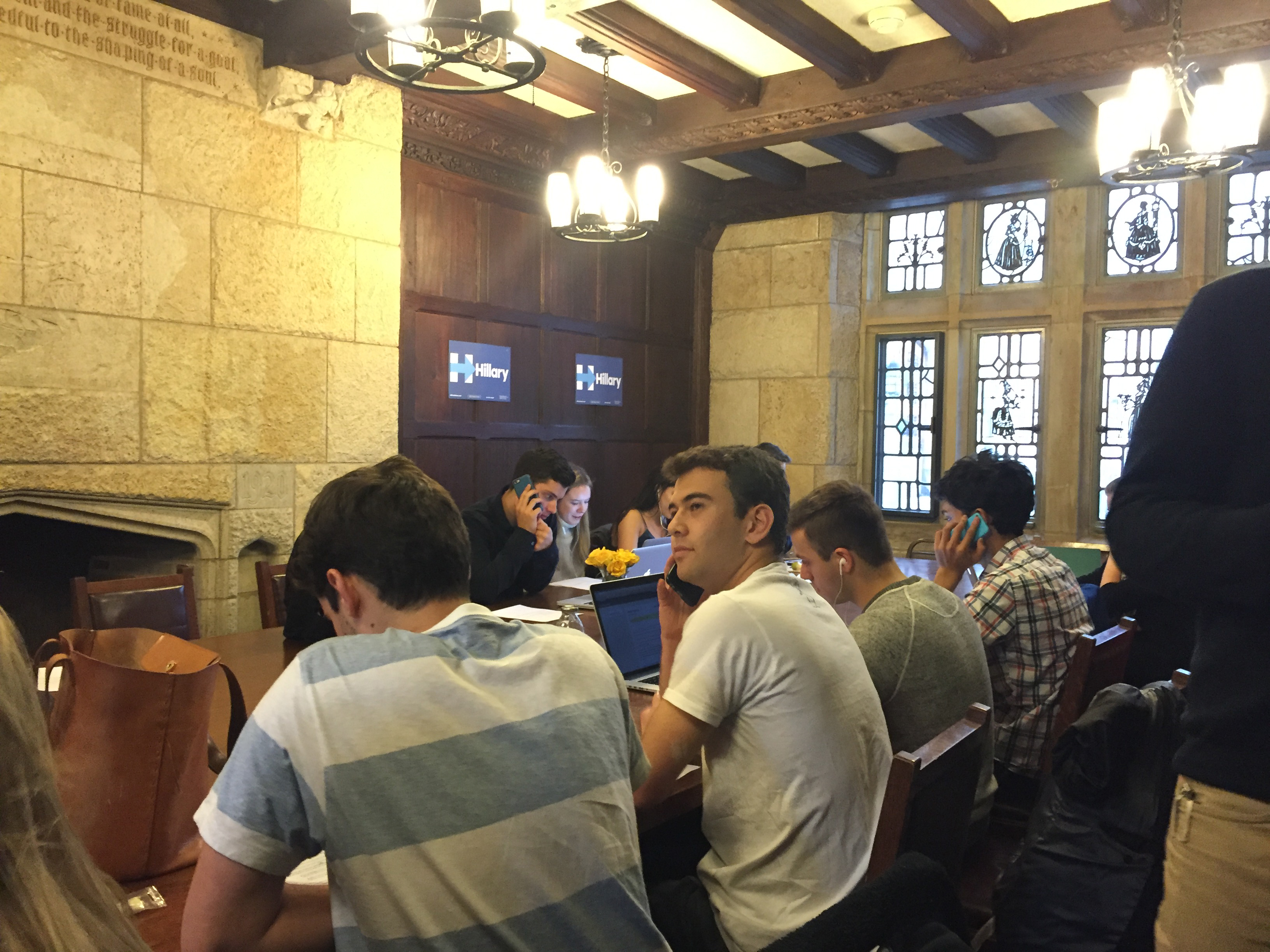
On Wednesday evening in the Branford Mendell room, a dozen Yalies gathered around a table, their phones and laptops at the ready.
The students, all active members of Yale Students for Hillary, participated in a phone bank to call potential voters in New Haven and raise support for presidential candidate Hillary Clinton LAW ’73 in Connecticut’s upcoming primary, which is scheduled to take place April 26. Yale Students for Hillary arranged the event in conjunction with Hillary for Connecticut, the state branch of the national Ready for Hillary campaign. The phone bank is one in a series of student pushes for voter engagement in the last few weeks leading up to the Democratic and Republican primaries.
“The Internet is not a substitute for getting people to vote,” said former Vermont Gov. Howard Dean ’71, who was present at the phone bank. “The 50-state strategy was designed to have places in every state, including places like Connecticut which reliably vote Democratic, to have a party where we can be strong and … to invest early in places and get people comfortable with the notion of being in favor of Democrats.”
Dean opened the event with remarks supporting Clinton and student action in politics, stressing the importance of personal contact with voters. He cited Clinton’s bipartisan support for legislation and her understanding of foreign policy and national security. Dean said a major factor in his decision to endorse Clinton in September 2015 was her ability to “get something done,” a quality he said was lacking in her opponent, Vermont Sen. Bernie Sanders.
Following Dean’s remarks, the students began dialing. The calls, which lasted anywhere from several seconds to several minutes, aimed to convince residents to vote and volunteer for Clinton. A typical phone bank will result in several hundreds of calls per evening, Hillary for Connecticut press team member Jack Miller said.
“There are hundreds of thousands of people in the phone bank,” Miller said. “We work with our data team to make sure that these are the most effective [phone] numbers.”
According to Miller, effective numbers are those that belong to demonstrated primary voters.
Students at the phone bank said they were drawn to Clinton’s campaign by her experience and policy work.
“I think predominantly [Clinton] understands issues in a way that the other candidates, on both sides of the aisle, don’t,” said Haley Adams ’16, co-president and founder of Yale Students for Hillary, which she founded in 2013. “She has really nuanced, in-depth solutions to problems, and while it’s important to draw attention to issues, it’s more important to actually have a solution.”
While some students have thrown their support behind Clinton, other campus Democrats have instead backed Sanders by joining Yale Students for Bernie.
Yale Students for Bernie co-founder and co-chair Matthew Massie ’17 cited Sanders’ progressive policies and positions on issues such as financial accountability as reasons for his support of the senator’s campaign.
“The reason I see a lot of people voting for Bernie Sanders is that … the things that I hear Bernie Sanders discuss are things that shackle students to tremendous debt and a bad economy and that applies to the [students] here,” Massie said.
Yale student campaigns for both Clinton and Sanders have carried out similar tactics to attract voters for their candidates. Both groups have hosted phone banks and canvassed in New Hamphire and Massachusetts, Adams and Massie said.
Each organization has also collaborated with the Yale Democrats to increase voter registration and bring more Democrats to the polls, he added.
“What I think is great about the Yale’s campaign discourse is that it’s been pretty friendly; there’s not any animosity,” Adams said.
Volunteers for Ready for Hillary said although they saw strong support for Clinton on campus, campaign members for each candidate were friendly with each other. Adams added that Yale Students for Bernie and Yale Students for Hillary have co-hosted events, such as watch parties for Democratic debates.
Massie described the Yale Democratic campaigns as “nothing but kind and cordial.”
“We just happen to disagree on the presidential race,” Massie said.
Correction, April 7: A previous version of this article incorrectly misstated Howard Dean’s title; in fact, he is a former Vermont governor, not senator.







